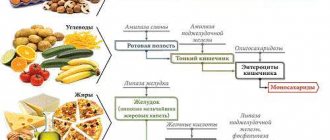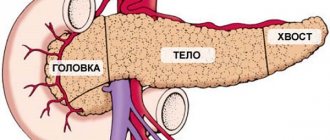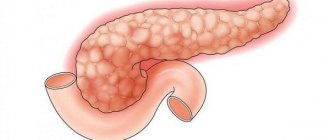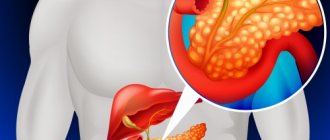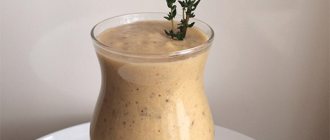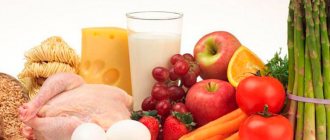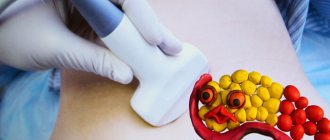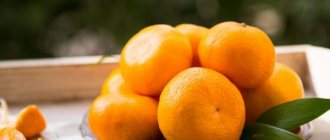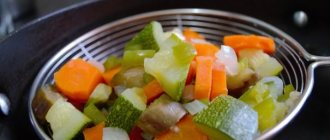The pancreas is one of the most important organs of the human digestive system. It is she who produces special enzymes that take an active part in the breakdown of fats, proteins and carbohydrates, and hormones that regulate the amount of blood sugar.
However, it often happens that its functions are disrupted, the production of enzymes stops and inflammation develops, which in medical practice is called pancreatitis. Chronic or acute, pancreatitis is one of the most common diseases, one of the causes of which is malnutrition. That is why, in order for the organ to function well, it is necessary to consume healthy and proper foods.
Consequences of poor nutrition for the pancreas
The pancreas performs the functions of internal secretion (produces hormones) and regulates metabolism, being directly involved in the digestive process. The absorption of nutrients contained in food depends on its work - it produces enzymes (lipase, amylase, nuclease) that break down proteins, fats and carbohydrates in the duodenum.
Lifestyle and the foods consumed directly affect the functioning of the pancreas: bad habits and the predominance of unhealthy foods on the menu lead to a slowdown in the production and movement of pancreatic secretion; it remains in the ducts of the pancreas without entering the duodenum. Digestive processes are disrupted, the pancreas becomes inflamed - acute pancreatitis develops, quickly turning into a chronic form.
With long-term chronic pancreatitis, the structure of the pancreatic tissue is destroyed, the production of enzymes and hormones is reduced, metabolism is disrupted, and secretory insufficiency and diabetes mellitus gradually develop. The risk of developing pancreatic cancer increases.
You may be interested in: Foods good for the heart and blood vessels
The role of water, why does it help?
When you have pancreatitis, it is important to drink a lot of water, doctors say. But they do not explain why this needs to be done. In fact, water helps digest food, as it “dilutes” it and facilitates the digestion process. The oxygen it contains is quickly absorbed into the blood and delivered to every organ, including the pancreas. But it is important to consume pure water, and not tea, coffee, compote or juice.
It should not be cold or hot; room temperature is optimal. Another important condition is that any carbonated water, even mineral water, is prohibited. You can drink plain water when it is convenient for a person - before meals, during meals, or even after a meal, contrary to popular belief that it will interfere with digestion.
https://youtu.be/WRv3j-Lw5fE
Diet rules for maintaining pancreas health
The best way to prevent pancreatitis and pancreatic cancer is proper nutrition.
For the normal functioning of the organ or in case of existing problems, it is important to remember and follow a few simple rules:
- Limit completely or partially fried and excessively fatty foods in your diet.
- Meals should be regular, five to six times a day.
- Limit the consumption of raw vegetables containing coarse fiber (cabbage, carrots, beets). It is recommended to boil or stew them.
- Take food in small portions, chewing thoroughly. Overeating negatively affects the condition of the entire digestive system.
- Try not to consume proteins, fats and carbohydrates at one time (adhere to the principles of separate nutrition).
- 1-2 times a month, arrange fasting days, consuming pureed soups, fermented milk products, and water porridge.
- Avoid foods that are too spicy, sour and sweet, and avoid smoked foods.
- Food should not be too cold or too hot.
Properly selected products, their preparation technology and a consistent food intake will help prevent the development of inflammation of the pancreas tissue.
Foods good for the pancreas
Proper nutrition for the prevention of pancreatic diseases is based on the consumption of foods that the stomach will not have difficulty digesting, and the gland will not need to increase the production of enzymes.
Including the following products in your diet will help maintain the health of an organ that is so important for every person and normalize its functioning in case of disorders.
Sea kale
Seaweed is rich in enzymes necessary for the functioning of the pancreas. They saturate the body with vitamins and minerals, relieve stress from the stomach and protect gland tissue from destruction. Moreover, to fully replenish nutrients, a small portion of cabbage (2 tbsp.) is enough.
Cobalt, zinc and nickel, which are part of seaweed, stimulate the production of insulin by the pancreas.
Kelp can diversify the usual side dishes, soups, and salads. It goes harmoniously with any dishes. The weekly norm of seaweed is 300 g.
Lean meat and fish
Chicken and turkey fillets, young beef, lean pork or rabbit meat are rich in protein, necessary for restoration processes in the pancreas.
It is also found in lean fish (flounder, carp, haddock, pike perch). At the same time, the fat content in these products is minimal, which eliminates the burden on the organ. Meat and fish are best steamed or baked.
Spinach
Contains vitamin A, beta-carotene, vitamin K, vitamins B, C and E. Fresh leaves are a good source of iron, manganese, potassium, iodine.
According to a study published in the American journal Journal of The National Cancer Institute, a diet that includes large amounts of spinach provides reliable protection against pancreatic cancer.
For chronic pancreatitis, spinach is recommended to be consumed in strictly limited quantities, since it contains oxalic acid, which enhances the production of pancreatic juice.
Blueberry
Blueberries are rich in anthocyanins, flavonoids with strong antioxidant properties. Regular consumption of blueberries, fresh or frozen, has a beneficial effect on the functioning of the pancreas, preventing the development of the inflammatory process and promoting the restoration of its tissues. It has been proven that blueberries improve metabolic processes, have a positive effect on insulin production, and improve bile secretion.
It is enough to eat a glass of berries a day; you can make fruit drinks, jelly, and puree from them. For chronic pancreatitis, the maximum daily dose of blueberries should not exceed 300 g.
Broccoli
Broccoli contains apigenin, an active flavone with anti-inflammatory and antitumor properties. Protects pancreatic tissue from pathogenic influences, inflammation and malignant neoplasms.
To obtain maximum health benefits, cabbage is recommended to be eaten raw or subjected to minimal heat treatment (steamed for 5-7 minutes).
Dairy products
Dairy products (non-acidic and low-fat cottage cheese, kefir, low-fat sour cream and mild cheese) are also sources of protein necessary for the normal functioning of the pancreas and the regeneration of its cells.
Fermented milk drinks improve the functioning of the entire digestive tract, normalize intestinal microflora, and strengthen the immune system.
It is not recommended to use dairy products that contain vegetable fats in the diet. It is strictly forbidden to include curd or cheese products containing palm oil and artificial additives in the menu.
Pumpkin
The golden vegetable contains many useful substances for maintaining pancreatic tissue in normal condition and restoring them: vitamins C, A, group B, copper, iron, zinc.
When consumed regularly, pumpkin removes toxins from the digestive system, accelerates metabolism, resists the development of the inflammatory process, and normalizes the production of pancreatic secretion.
It is recommended to consume pumpkin, baked or boiled, no more than 400-500 g per day.
Jerusalem artichoke
Jerusalem artichoke or Jerusalem artichoke is a source of inulin, which helps control blood sugar. For problems with the pancreas, Jerusalem artichoke is considered a very useful root vegetable. It has anti-inflammatory, regenerating and choleretic effects.
Jerusalem artichoke can be eaten raw, boiled or baked. 150 g of root vegetables per day is enough.
Oatmeal
Oats have a positive effect on digestive processes, improving the body's absorption of fats and carbohydrates. Consumption of oatmeal decoction helps cleanse the gallbladder of stagnant bile and toxins, and prevents the development of inflammation, since the functioning of the pancreas is closely related to the condition of the gallbladder and biliary tract (with cholecystitis, pancreatitis often develops).
To prepare a healing decoction to improve the condition of the digestive system, you need:
- take 2 cups of unpeeled oats;
- pour 3 liters of water into the cereal in a saucepan;
- place over high heat until boiling;
- Reduce heat to minimum and simmer the broth for 3-4 hours until a viscous consistency.
Drink 1/3 cup of the decoction three times a day before meals.
Regular consumption of oatmeal porridge is beneficial for the pancreas. Oatmeal contains a whole range of useful vitamins and minerals; it is easily digested without overloading the organ.
Yoghurts
Yogurts contain a lot of probiotics, which improve digestion processes (normalize motility) and increase the efficiency of both general and local immunity factors acting at the level of the wall of the digestive tube.
All this contributes to the balanced production of pancreatic enzymes and gives it time for additional rest.
Scientific work has demonstrated that enzymes in the stomach and pancreas digest food particles (especially proteins) much faster when yogurt is consumed frequently. This feature is of great importance in the presence of any disorders (acute and chronic pancreatitis, cholelithiasis, anomalies of the ducts of the pancreato-biliary tract).
What doesn't the pancreas like?
The pancreas is sensitive to harmful factors.
To maintain the normal functioning of the organ and prevent the development of diseases, the following products should be limited or completely eliminated:
- Sausages . This is a time bomb that will definitely explode if consumed in excessive quantities. Sausages and sausages contain a lot of chemicals and trans fats. When they are consumed, a considerable load is placed on the pancreas, which can result in acute inflammation of the organ.
- Alcohol . Alcohol abuse is one of the most common reasons that leads a person to a diagnosis of “acute pancreatitis.” Alcoholic drinks stimulate the production of digestive hormones and increase the synthesis of enzymes, which leads to their increased concentration in pancreatic juice. As a result, “protein plugs” form in the organ, which disrupt the outflow of secretions and lead to the degeneration of pancreatic tissue.
- Coffee . Caffeine increases the production of pancreatic juice (especially if you drink coffee on an empty stomach), so you should limit the drink to 1-2 cups per day. Even more harmful is instant coffee, which gastroenterologists generally do not recommend including in the diet.
- Fresh pastries, baked goods, white bread . They cause fermentation in the intestines and irritate the pancreas. It is recommended to consume dried baked goods.
- Milk . Contains lactose, for the digestion of which the pancreas needs to increase the production of digestive enzymes. For chronic pancreatitis, milk is not recommended because it causes profuse diarrhea.
- Sugar . _ It is a strong irritant to the pancreas. In addition, store-bought sweets contain harmful chemicals, which are very difficult for her to deal with. You can sometimes treat yourself to natural treats: marshmallows, marmalade, marshmallows.
- Fatty meat (lamb, pork, duck). To break down the fat in meat, the pancreas is forced to intensively produce lipase (an enzyme for breaking down fats). In addition, digestion of fatty meat lasts more than 5-6 hours and often causes putrefactive processes in the digestive tract, causing inflammation.
These recommendations can also be followed by healthy people who want to maintain normal pancreatic function.
In case of chronic pancreatitis, it is recommended to reduce the amount of carbohydrates in the diet to 40 g, mainly due to simple ones (limit jam, sweets, cookies, cakes). You should not include in your diet foods that irritate the mucous membrane of the stomach and intestines and provoke increased production of hydrochloric acid and pancreatic juice.
A balanced diet, consuming the right proportions of nutrients, proper cooking of foods, and avoiding alcohol will help maintain not only the pancreas, but also overall human health.
The following research and materials were used in writing the article:
- Ilya Melnikov “Nutrition for diseases of the pancreas (pancreatitis).”
- A. Sinelnikova “220 recipes for pancreatic health.”
- Irina Vecherskaya “100 recipes for pancreatitis. Tasty, healthy, soulful, healing.”
- V. Nemtsov “Proper nutrition for diseases of the pancreas.”
Prohibited food additives
Without food additives it is impossible to imagine many familiar products that can be found on the shelves of stores and supermarkets. And although dietary supplements are a synthetic product, some of them can be beneficial for the human body. However, food additives such as E1442 and E1422 are dangerous to the health of the pancreas.
The fact is that the food additive E1422, which is essentially a modified starch, negatively affects digestive functions and provokes the development of such a serious and practically incurable disease as pancreatic necrosis.
And the food additive E1442, a harmful thickener, disrupts the functioning of the pancreas, which is unable to produce the enzymes necessary to break down this substance.
Most often, food additives E1442 and E1422 are used as a thickener for many dairy products.
